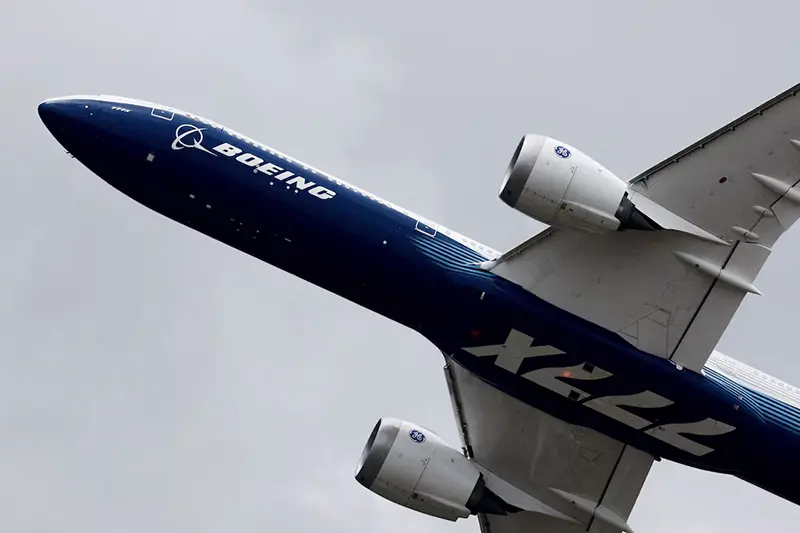April 24, 2024 – 7:12 AM PDT

(Reuters) – Boeing (BA.N) on Wednesday reported its first quarterly revenue drop in seven quarters, but the U.S. planemaker beat Wall Street expectations that were lowered after a January mid-air blowout of a cabin door prompted it to slow production of its strongest-selling jets.
After the report, Boeing’s Chief Executive Dave Calhoun told CNBC that a deal to acquire its key supplier Spirit AeroSystems (SPR.N) is more than likely during the second quarter. The two have confirmed tie-up talks, although pricing remains a challenge in the complex deal.
Boeing said first-quarter cash burn, a metric closely watched by investors, was $3.93 billion, better than average analyst expectations of a cash burn of $4.49 billion.
In March, Boeing indicated it would use between $4 billion and $4.5 billion due to a crisis following the Jan. 5 accident involving a nearly new 737 MAX 9 jet.
Boeing’s shares, which have sunk 35% year to date, were up 1% in early trading after its loss per share was narrower than expected. Spirit Aero’s shares rose 1%.
“Well it could have been worse. While the loss and the cash outflow are not as bad as feared, the company is still clearly facing some serious challenges in the Commercial Aircraft division that will take some fixing,” Vertical Research Partners analyst Robert Stallard said in a note.
Since the Jan. 5 accident on an Alaska Airlines-operated jet, the U.S. Federal Aviation Administration (FAA) has imposed a cap on production of Boeing’s strong-selling 737 MAX jets. The FAA also has told Boeing to develop a comprehensive plan to address “systemic quality-control issues.”
Before the report, Calhoun, who will step down around year end, said in a letter to employees on that Boeing was “in a tough moment”, slowing the system to improve quality and safety.
“Lower deliveries can be difficult for our customers and for our financials. But safety and quality must and will come above all else,” he added.
Quarterly revenue was $16.57 billion, down from $17.92 billion a year earlier but beating expectations of $16.23 billion.
While Boeing has not named a successor, Calhoun told CNBC he believes commercial airplanes boss Stephanie Pope has potential to run the company.
Reuters reported this month that output of Boeing’s cash-cow 737 MAX had fallen sharply as U.S. regulators stepped up factory checks.
Analysts have warned the slow pace of deliveries could delay Boeing’s financial and production goals. Boeing’s CFO said last month the company needs more time to hit a goal outlined in 2022 for an annual cash flow of about $10 billion by 2025 or 2026.
That goal is seen as key as Boeing works to accelerate its recovery from an earlier crisis after two MAX jets crashed in 2018 and 2019.
The company also expects a slower increase in the production rate and deliveries of its 787 widebody jets due to supplier shortages “on a few key parts,” a memo showed on Monday.
Yet with production constrained at Boeing and its rival Airbus, demand remains strong, though the European planemaker increased its lead in the narrowbody market in the first quarter.
Calhoun said Boeing would have “largely delivered” its inventory of 737s and 787s by the end of the year, bringing in much-needed cash. He added that its defense business, which has been losing money in recent quarters, “will be progressing toward more historical levels of performance.”
Operating margins at Boeing’s defense business rebounded to 2.2% in the quarter from a negative 3.2% a year ago, though it still lost $222 million on certain fixed-price development programs.
Boeing delivered 67 737s in the quarter through March, down 41% from last year. Planemakers receive the bulk of the cash upon delivery of the aircraft.
Combined with compensation Boeing had to pay airlines for the temporary grounding of MAX 9 aircraft, margins at its commercial airplanes business deteriorated to negative 24.6% from negative 9.2%.
Overall adjusted loss per share narrowed to $1.13, beating expectations of loss per share of $1.76, as per LSEG data.
Reporting By Allison Lampert in Montreal and Abhijith Ganapavaram in Bengaluru; Editing by Anil D’Silva, Chizu Nomiyama and David Gregorio

